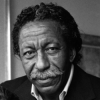Gordon Parks

Gordon Parks
Gordon Parkswas a noted American photographer, musician, writer and film director, who became prominent in U.S. documentary photojournalism in the 1940s through 1970s—particularly in issues of civil rights, poverty and African-Americans—and in glamour photography. As the first famous pioneer among black filmmakers, he was the first African-American to produce and direct major motion pictures—developing films relating the experience of slaves and struggling black Americans, and creating the "blaxploitation" genre. He is best remembered for his iconic photos of poor Americans...
NationalityAmerican
ProfessionPhotographer
Date of Birth30 November 1912
CityFort Scott, KS
CountryUnited States of America
There's another horizon out there, one more horizon that you have to make for yourself and let other people discover it, and someone else will take it further on, you know.
The man at Kodak told me the shots were very good and if I kept it up, they would give me an exhibition. Later, Kodak gave me my first exhibition.
Washington, D.C. in 1942 was not the easiest place in the world for a Negro to get along.
Enthusiasm is the electricity of life. How do you get it? You act enthusiastic until you make it a habit.
I saw that the camera could be a weapon against poverty, against racism, against all sorts of social wrongs. I knew at that point I had to have a camera.
The subject matter is so much more important than the photographer.
If you don't have anything to say, your photographs aren't going to say much.
At first I wasn't sure that I had the talent, but I did know I had a fear of failure, and that fear compelled me to fight off anything that might abet it.
I suffered first as a child from discrimination, poverty ... So I think it was a natural follow from that that I should use my camera to speak for people who are unable to speak for themselves.
The photographer begins to feel big and bloated and so big he can't walk through one of these doors because he gets a good byline; he gets notices all over the world and so forth; but they're really - the important people are the people he photographs.
Photography was my choice of weapons.
And now, I feel at 85, I really feel that I'm just ready to start.
I bought my first camera in Seattle, Washington. Only paid about seven dollars and fifty cents for it.
I had known poverty firsthand, but there I learned how to fight its evil - along with the evil of racism - with a camera.